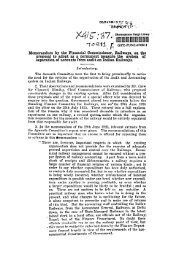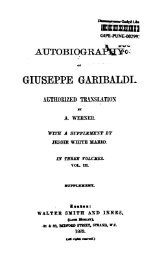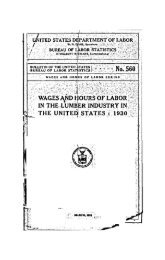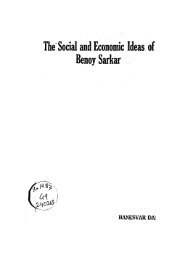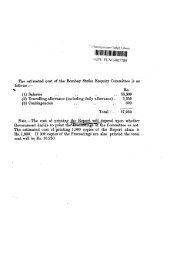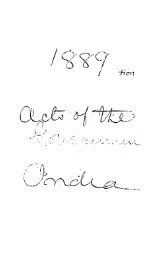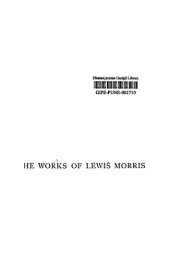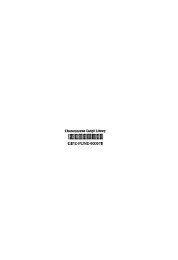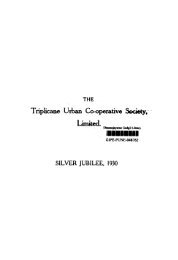Create successful ePaper yourself
Turn your PDF publications into a flip-book with our unique Google optimized e-Paper software.
December 18th, 1925 INDIAN OPINION 327<br />
--- --------------------------------------------<br />
llifp, which served to increase his ill health; an4 he<br />
oVl'riltrained hims~lf again mntally by his extraordinary<br />
absorption in study and reading; for this<br />
nu'ntai enrgy now took the phce of his former<br />
activity in outward things. Whatever might be the<br />
callRe, in prison be hecame at i.u;t very unwell; and<br />
at a mOAt critical moment, when his hfe itself was at<br />
stak. the operation for appendicitis was performed.<br />
Then a conval('scE'nce for some months ensued. This<br />
convalescence wa'! all too soon brought to a· ... close.<br />
and o/Jce more tbe round of outward activities began.<br />
whkh l,ecame almost never ending. Day and<br />
night wel'e alike taken up With the demands, which<br />
were made upon him for 'dmRhan' and for special<br />
ViRUS to every part of the country. Only those who<br />
have hpl'll with him on thoRe journeys can have any<br />
Idea how tcrllLle the iltrain WaS! One after another<br />
of his companiollR who accompanied him broke<br />
down under it. bnt he himself seemed never to give<br />
way. As I have said, It was only his inner spirit<br />
that, sustained him.<br />
Again, last year. came all the agony of the Hindul\fuAlim<br />
rIOts and disturbances, which reached such<br />
a pitch at last. that MahatmaJi felt It impossible. to<br />
endure the anguish of them any longer. Night<br />
after night he lay aW.J.ke. ql1lte sleepless, seeking for<br />
some light to gmde him III the darkness. Then<br />
sudddenly there came to him, as it. a Vision direct<br />
from God, a flash of illumination. He declared his<br />
determination to fast for twenty-one days both as a<br />
penance and as a means of healing the terrible<br />
brt;ach between the two communitIes, which had<br />
grown wider and WIder.<br />
All through that fabt,-as also through his previous<br />
illncl'''''s,-lt was my very gre,ltest privilege to<br />
be with him. It is not possible here fully to record<br />
all that happened: and it h:ts been told many times<br />
before. But it may eaSily be understood. how<br />
serious the physlc"l strain was, when I write, that<br />
on the twelfth day of the fast the doctors regarded<br />
hiS life as in serious danger and implored him to<br />
break the fast itself. IllS charactenstic reply was<br />
'Have fdlth in God.' In that faith. he conqnered his<br />
physical illness ancl came through triumphant.<br />
At the end of the fast, his recovery of health was<br />
quite remarkable. After a few weeks he was cert,liniy<br />
better, both in body and mind, than he had<br />
been for many years Even his remarkable walkin~<br />
poweri came back again. and he would start out,<br />
WIth his long stick in hand, at such a pace, that itwas<br />
cl:fficnlt fOI' those with him sometimes to<br />
keep up with him I Indeed, at this time, he was<br />
able to accomplish as much as ten DlIies a day; and<br />
he kept up his stt'pngth all through the cold weather<br />
of 1924-1\)25.<br />
But suddenly, about April, 1925, came a most unexpected<br />
attack of malarMI fever: and though he<br />
appeared to throw it off QUickly, it is clear that the<br />
malarial poison still remdined in his blood. Yet<br />
even then he began all too soon, at an extremely<br />
early date, to go on tour again after the attack; and<br />
when he came to Bengal in order to meet with<br />
Deshbandhu C. R. Das, it was clear to me that the<br />
strength, whICh he had regained all through the<br />
cold weather. was rapidly bClDg dissipated. .<br />
FiullUy came one of the greatest sorrows he has<br />
ever had. Deshbandhu died quite suddenly at<br />
Darjeeling; and in a moment all tho cares and responsibihties<br />
fell upon him alone. which Deshbandhn<br />
C. n. Das had carried before. He remained in<br />
Calcntta and BElngal for three full months collecting<br />
for the Df>shbandhu Memorial Fund. He wore himself<br />
out, day after ddY, WIth an energy and devotion<br />
that never tired. At last. ill the month of September,<br />
even hiS own amazing vitdlity began to show<br />
signs again of weakening. He pleadell to be 'lllowed<br />
to cancel the tellt of his viSit in Behar and the<br />
t1n1tG4 l'rgv!t1dc:_,1II1l that hu, ftll"M fett1l't1. \I'! hili<br />
I'1wn ABram, The (loIlRre •• l"cal leadsn of \he Hortb<br />
frl'ely and gladly gave him leave: and he went b'I.Ck<br />
to Western Inllia in the hope of obtaining some rest.<br />
But the people of Kutch had made up their minds<br />
to have him with them: and they implored him not<br />
to cancel his Kutch visit. They promised him a<br />
complete holiday. if he would only remain in the<br />
KIJtch State as their revered and venerated guest.<br />
Mahatma Gandhi agreed to this; but the idea of<br />
giving him a 'holiday' was hardly understood in its<br />
proper sense by the Kutch pea pie. Indeed, instead<br />
of any reRt and repose, he was compelled to undergo<br />
the most physically t>xhausting time of the<br />
whole year over the rongh Kuth roads. Not only<br />
was he physically tired out; bnt his mind also was<br />
shocked and pained by what he saw of UntouchabilIty<br />
in all its evil effects in that corner of India.<br />
Perhaps the mental strain he endured in Kntch was<br />
greater even than the physical. He lost ei"ht<br />
pounds in weight in a fortnight's time, and when he<br />
reached Sabarmati at last he was entirely exhausted.<br />
But his marvellons spiritual vitality still sustains<br />
him; and when I went to se') him, just before I left<br />
for South Africa, he had again wonderfully recovered.<br />
He was very bright and cheerfnl; and he<br />
was again able to do his work right on throughout<br />
the day. He sent his love and deep affection to all<br />
both Indians and Europeans who remember him in<br />
South Africa.<br />
His day's work in India begins at 4: a.m. with his<br />
prayer and worship of God. He goes on with hia<br />
different engagements throughout the day. He lives<br />
mainly on two thJngs,-oranges and goat's milk. It<br />
is not possible alas! now to assert that his old physical<br />
vigour has all returned; for he gets easily tired<br />
in body and a short walk is quite enough for him.<br />
Nevertheless, his mental and intellectual energy is<br />
as fresh as ever: and his spiritual hold over the<br />
masses of the people of India,-Hindu and Musalman<br />
alike,-is by no means abated. Wherever he<br />
goes, the whole countrysid, for miles round, flocks<br />
to see him; and in homely simple ways he drives<br />
home the lesson, (0 of getting rid of untouchability,<br />
(ii) of healing the breach between Hindus and Mos<br />
It'ms, (iii) of never touching drink or drugs. and last<br />
and most enthusiastically of all (iv), the duty of<br />
wearing homespun khaddar cloth and thus reviving<br />
Indian village hfe on itA economic side.<br />
~~~~~~ »o,»)o,>l;>,»;»;»;>.,);»> ~<br />
~ OUR LONDON LETTER !<br />
, [ FROM OUR OWN CORRESPONDENT] .:<br />
! 12th November, 1925. i<br />
o~E(E(E );>~);»> 0<br />
The Begum of Bhopal is still in London. On hAr<br />
visit to the Mosque at Weking, she was presented<br />
with an address by Lord Headly, on behalf of the<br />
British Muslim Society. In reply she declared that<br />
she was proud to belong to the British Empire,<br />
which stood for the toleration of all religions. Her<br />
visit, apart from her being a Muslim, was of peculiar<br />
interest, for her descendants had largely contribnted<br />
to the building of the Mosque, and she herself had<br />
promised to help in t.he extension of the Mosque,<br />
the better to enable it to accommodate ifs increasing<br />
worshippers.<br />
The Bl'gum was a deeply interested spectat or of<br />
the proceedings, during the two minutes silence at<br />
the Cenotaph on Armistice Day. She was so impressed<br />
with the significance of it all : the memory<br />
of the fallen, the widows, the orphans, and the disabled.<br />
anJ. what was due to them all by those who<br />
live, that to mark her sense of appreciation she sent<br />
a cheque for £5,000 to Earl Haig's Fund for the<br />
British Legion. But this was not all, she allowed<br />
her graud daughters clad in Highland dress to sell<br />
poppies on Poppy Day in London.<br />
Emile OOlle the rttlneb p~(lbolo!Jiet. dill



